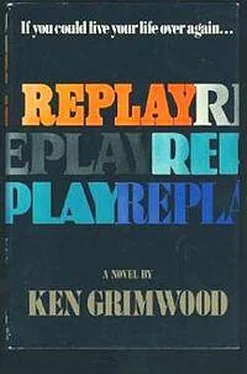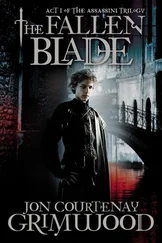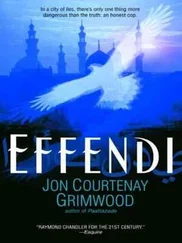"You do want her to be accepted at Sarah Lawrence, don’t you?" Diane snapped between bites of bay scallops à la nage.
"She’s thirteen years old." Jeff sighed. "The admissions office at Sarah Lawrence doesn’t give a damn what she does at that age."
"I was at Concord Academy when I was eleven."
"That’s because your parents didn’t give a damn what you did at that age."
She set down her fork, glared at him. "My upbringing is no concern of yours."
"But Gretchen’s is."
"Then you should want her to have the best possible education, from the beginning."
One waiter cleared their empty plates away as another approached with the dessert wagon. Jeff took advantage of the interruption to lose himself in the multiple reflections from the restaurant’s many mirrors: the fir-green walls, the crimson banquettes, the splendid floral bouquets that looked freshly cut from a Cezanne landscape.
He knew Diane was less concerned for Gretchen’s education than for her own freedom from daily responsibility. Jeff saw his daughter little enough as it was, and he couldn’t bear the thought of her living two hundred miles from home.
Diane picked crossly at her raspberries in Grand Marnier sauce. "I suppose you think it’s all right for her to continue associating with all those little urchins she keeps dragging home from public school."
"For Christ’s sake, her school is in Rhinebeck, not the South Bronx. It’s a wonderful environment for her to grow up in."
"So is Concord. As I know from personal experience."
Jeff dug into his Peach Charlotte, unable to say what was really on his mind: that he had no intention of seeing Gretchen mature into a clone of her mother. The brittle sophistication, the world-be-damned attitude, great wealth seen as a birthright, something to be assumed and utterly relied upon. Jeff had acquired his own riches by a stroke of supranormal good fortune and by force of will. Now he wanted to protect his daughter from money’s potentially corrupting influence as much as he wanted her to reap its benefits.
"We’ll discuss it another time," he told Diane.
"We have to let them know by next Thursday."
"Then we’ll discuss it Wednesday."
That put her into a serious pout, one he knew she could resolve only by a concentrated, almost vicious, splurge at Bergdorf’s and Saks.
He patted his jacket pocket, took out two foil-wrapped tablets of Gelusil. His heart might be in excellent shape, but this life he’d created for himself was playing hell with his digestion.
Gretchen’s slender young fingers moved gracefully over the keyboard, yielding the poignant strains of Beethoven’s "Fur Elise." The fat orange cat named Chumley slept sprawled beside her on the piano bench, too old now to frolic with the reckless abandon he once had shown, content merely to be close to her, soothed by the gentle music.
Jeff watched his daughter’s face as she played, her smooth, pale skin surrounded by the dark curls of her hair. There was an intensity to her expression, but it was not caused, he knew, by concentration on the notes or tempo of the piece. Her natural gift for music was such that she needed never struggle to memorize or drill herself on the basics of a composition once she’d played it through the first time. Rather, the look in her eyes was one of transport, of a melding with the wistful melody of the deceptively simple little bagatelle.
She rendered the coda of chords and double notes over a repeated-note pedal point with expert legato, and when she was done she sat silent for several moments, returning from the place the music had taken her. Then she grinned with delight, her eyes those of a playful girl again.
"Isn’t that pretty?" Gretchen asked ingenuously, referring only to the beauty of the music itself.
"Yes," Jeff said. "Almost as pretty as the pianist."
"Oh, Daddy, cut it out." She blushed, swung herself coltishly from the bench. "I’m gonna have a sandwich. You want one?"
"No, thanks, honey. I think I’ll wait till dinner. Your mother should be back from the city any time now; when she gets home, tell her I took a walk down by the river, O.K.?"
"O.K.," Gretchen called, scampering toward the kitchen. Chumley woke, yawned, and followed her at his own ambling pace.
Jeff stepped outside, walked along the path through the trees. In autumn the corridor of elms was like a half-mile shaft of enveloping flame. Emerging from it, Jeff saw first the broad meadow descending gently toward the Hudson, then the steeper drop a hundred yards to the left where a rocky chain of waterfalls cascaded in the chill. The dramatic entrance to this place never failed to give him a thrill of awe, that such beauty could exist; and of pride, that it was his possession.
He stood now at the crest of the sloping green, contemplating the vista. Two small boats moved quietly down the river beneath the blaze of fall colors on the far side. A trio of young boys ambled along the opposite bank, idly tossing stones into the coursing water. At the top of a rise above them was a stately home, less grand than Jeff’s but still imposing.
In another three months the river would be frozen solid, a great white highway stretching south toward the city and north toward the Adirondacks. The trees would be bereft of leaves, but seldom barren: Snow would lace their branches, and some days even the smallest twigs would be encased in a cylinder of ice, glittering by the millions in the winter sunlight.
This was the land, the very county, that Currier and Ives had mythologized as the American ideal; they’d even sketched this precise view. Standing here, it was easy to believe that all he’d done had been worthwhile. Standing here, or holding Gretchen in his arms, embracing the child he and Linda had once yearned for but could never have.
No, he wouldn’t send his daughter to Concord. This was her home. This was where she belonged until she was old enough to make her own decisions about leaving it. When that day came, he’d support whatever choices she might make, but until then—
Something unseen stabbed his chest, something more painful and powerful than he had ever felt before … except once.
He crumpled to his knees, struggling to remember what day it was, what time it was. His staring eyes took in the autumn scene, the valley that had, an instant before, seemed the very emblem of hope regained and possibilities unbounded. Then he fell on his side, facing away from the river.
Jeff Winston gazed helplessly at the orange-red tunnel of elms that had led him to this meadow of promise and fulfillment, and then he died.
He was surrounded by darkness, and by screams. A pair of hands clutched at his right arm, fingernails stabbing through the fabric of his sleeve.
Jeff saw before him an image of Hell: weeping children, shrieking and stumbling as they ran, unable to escape the black, winged creatures that swooped and pecked at the children’s faces, mouths, eyes …
Then an icily perfect blond woman pulled two of the little girls into an automobile, safe from the onslaught. He was watching a movie, Jeff realized; a Hitchcock movie, The Birds.
The pressure on his arm subsided along with the scene’s intensity, and he turned his head to see Judy Gordon smiling a girlish, embarrassed smile. On his left, Judy’s friend Paula snuggled into the protective curve of young Martin Bailey’s arm.
1963. It had all begun again.
"How come you’re so quiet tonight, honey?" Judy asked him in the back seat of Martin’s Corvair as they rode to Moe’s and Joe’s after the movie. "You don’t think I was silly to get so scared, do you?"
"No. No, not at all."
She intertwined her fingers with his, leaned her head against his shoulder. "O.K., just so you don’t think I’m a ninny." Her hair was fresh and clean, and she’d dabbed a few drops of Lanvin on her slim, pale neck. Her sweet scent was exactly as it had been on that awkward night in Jeff’s car, twenty-five years ago … and before that, almost half a century ago, on this same night.
Читать дальше












